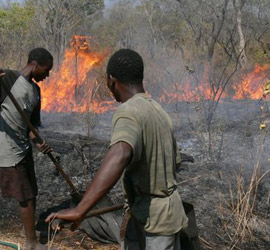Community-Based Fire Management in Central Mozambique


Photo: Envirotrade.co.uk
The incidence of bush fires in Mozambique has become an issue of growing concern at the district and national level in recent years. These fires have ramifications for human health and safety, economic development and the maintenance of ecological diversity. As the process of climate change continues, the frequency and intensity of these fires is anticipated to increase.
To reduce current vulnerability to uncontrolled bush fires in the central Mozambican Provinces of Sofala and Inhamabane, and promote the inclusion of vulnerability to climate change into relevant district level and national policies, a multi-pronged strategy is being implemented. Fire fighting and prevention skill-building are being undertaken in six communities through the training of community rangers.
At the provincial level, a multi-stakeholder round table for wild fire coordination has been established to increase capacity to respond to fire outbreaks. Regional satellite information is also being accessed as part of early warning/disaster preparedness activities. At the national level, the project is working with Mozambique’s National Adaptation Programme of Action (NAPA) committee and National Disaster Management Institute (INGC) to promote the integration of climate change considerations into selected national agriculture, forestry and disaster management policies.
Local Executing Agency: AMBERO-IP with Deutsche Gesellschaft fuer Technische Zusammenarbeit (GTZ)
(0) Comments
There is no content